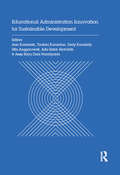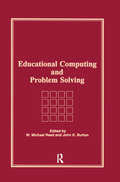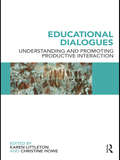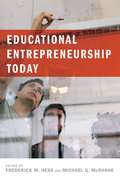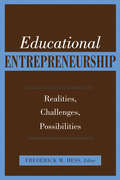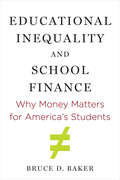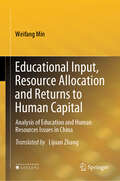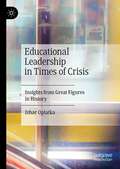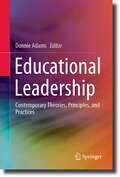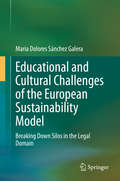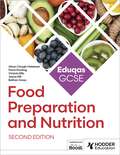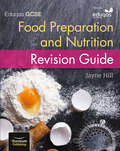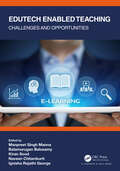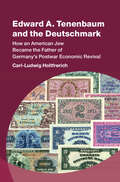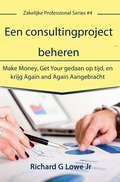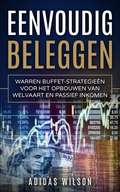- Table View
- List View
Educational Administration Innovation for Sustainable Development: Proceedings of the International Conference on Research of Educational Administration and Management (ICREAM 2017), October 17, 2017, Bandung, Indonesia
by Aan Komariah Taufani C. Kurniatun Dedy A. Kurniady Rita Anggorowati Ade Gafar Abdullah Asep Bayu Dani NandiyantoThe International Conference on Research of Educational Administration and Management (ICREAM) held on October 17, 2017 in Bandung, West Java, Indonesia. The aim of ICREAM is to provide a platform for educators, administrators, managers, leaders, policy makers, researchers, scholars, principals, supervisors, graduate students, practitioners, academicians, professionals and teachers from different discipline backgrounds to present and discuss research, developments and innovations in the fields of educational administration. It provides opportunities for the delegates to exchange new ideas and application experiences, to establish business or research relations and to find global partners for future collaboration.
Educational Computing and Problem Solving
by W Michael Reed John K BurtonFirst published in 1988. Professionals who are on the cutting edge of educational computing discuss, in this provocative new book, one of the most exciting prospects of the field--harnessing the power of the computer to enhance the development of problem-solving abilities. Here is everything that educators will need to know to use computers to improve higher level skills such as problem solving and critical thinking. Current aspects of problem-solving theory, a philosophical case for including programming languages in the curriculum, state-of-the-art research on computers and problem solving, and a look at problem-solving software are included in this comprehensive volume. The research and its application to instruction are grounded in problem-solving theory--making this book a unique and critical addition to the existing literature.
Educational Dialogues: Understanding and Promoting Productive interaction
by Karen Littleton Christine HoweEducational Dialogues provides a clear, accessible and well-illustrated case for the importance of dialogue and its significance for learning and teaching. The contributors characterise the nature of productive dialogues, to specify the conditions and pedagogic contexts within which such dialogues can most effectively be resourced and promoted. Drawing upon a broad range of theoretical perspectives, this collection examines: theoretical frameworks for understanding teaching and learning dialogues teacher-student and student-student interaction in the curricular contexts of mathematics, literacy, science, ICT and philosophy the social contexts supporting productive dialogues implications for pedagogic design and classroom practice. Bringing together contributions from a wide range of internationally renowned researchers, this book will form essential reading for all those concerned with the use of dialogue in educational contexts.
Educational Entrepreneurship Today (Educational Innovations Series)
by Frederick M. Hess Michael Q. McShaneIn this book, Frederick M. Hess and Michael Q. McShane assemble a diverse lineup of high-profile contributors to examine the contexts in which new initiatives in education are taking shape. They inquire into the impact of entrepreneurship on the larger field―including the development and deployment of new technologies―and analyze the incentives, barriers, opportunities, and tensions that support or constrain innovation. The book offers critical perspectives on the impact of entrepreneurship and also includes lessons from leading entrepreneurs, in which they use case studies drawn from their own experience to illustrate the realities of leading disruptive change in education and pose guiding questions for the next generation of innovators. In a time of increasing polarization around education policy, this timely, frank, and insightful volume shows how we can begin to create systems in which entrepreneurial ideas and fresh thinking are welcomed, constructively employed, and held accountable for the public good.
Educational Entrepreneurship: Realities, Challenges, Possibilities
by Frederick M. HessThis lively and provocative book introduces this burgeoning field for readers concerned with K-12 education in the United States--and with efforts to reform and improve it. Entrepreneurship has emerged in recent years as an unprecedented and influential force in U.S. K-12 education. Yet the topic has received surprisingly little serious or systematic attention. Educational Entrepreneurship aims to fill this gap. This timely volume addresses a number of central questions: What is educational entrepreneurship and what does it look like? Who are the educational entrepreneurs and what motivates them? What tools do entrepreneurs need to be successful? What policies or practices enable or impede entrepreneurship? What would it mean to open up the education sector to more entrepreneurial activity? An interesting and admirable range of contributors offers clusters of articles on the nature of educational entrepreneurship; the political, policy, and legal contexts that face educational entrepreneurs; various models of entrepreneurial activity; the role of for-profit organizations in K-12 education; and possible future directions for educational entrepreneurs.
Educational Inequality and School Finance: Why Money Matters for America's Students
by Bruce D. BakerIn Educational Inequality and School Finance, Bruce D. Baker offers a comprehensive examination of how US public schools receive and spend money. Drawing on extensive longitudinal data and numerous studies of states and districts, he provides a vivid and dismaying portrait of the stagnation of state investment in public education and the continuing challenges of achieving equity and adequacy in school funding. Baker explores school finance, the school and classroom resources derived from school funding, and how and why those resources matter. He provides a critical examination of popular assumptions that undergird the policy discourse around school funding—notably, that money doesn&’t matter and that we are spending more and getting less—and shows how these misunderstandings contribute to our reluctance to increase investment in education at a time when the demands on our educational system are rising. Through an introduction to the concepts of adequacy, equity, productivity, and efficiency, Baker shows how these can be used to evaluate policy reforms. He argues that we know a great deal about the role and importance of money in schools, the mechanisms through which money matters for student outcomes, and the trade-offs involved, and he presents a framework for designing and financing an equitable and adequate public education system, with balanced and stable sources of revenue. Educational Inequality and School Finance takes an issue all too often relegated to technical experts and makes it accessible for broader public empowerment and engagement.
Educational Input, Resource Allocation and Returns to Human Capital: Analysis of Education and Human Resources Issues in China
by Weifang MinThis comprehensive study provides a groundbreaking analysis of China's educational landscape and its impact on human capital development, revealing how education shapes economic growth, social mobility, and workforce productivity. Through rigorous research and empirical evidence, the book demonstrates education's role as a powerful tool for enhancing career mobility and workplace productivity, reducing job search time for graduates, and creating pathways to reduce income inequality. With detailed insights into resource allocation, educational equity, and human capital returns, this book offers invaluable perspectives for policymakers, educators, and researchers committed to understanding and improving educational outcomes in China.
Educational Leadership in Times of Crisis: Insights from Great Figures in History
by Izhar OplatkaThis book aims to fill the gap in our knowledge about crisis management in schools, its particular characteristics, and strategies from a historical point of view. It combines knowledge about educational leadership with biographical narratives of great leaders in history who have faced a tremendous crisis successfully and from whom we can learn a lot about effective coping strategies in times of crisis. The leaders in the book represent different nations and organizations, facing political, military, economic or social crises. The book provides a deeper knowledge necessary for preparing for a possible crisis and for managing it in successful ways if it comes and adds novel insights into the field of educational administration and leadership in the twenty-first century.
Educational Leadership: Contemporary Theories, Principles, and Practices
by Donnie AdamsThis book provides a rigorous grounding in contemporary educational leadership theories and their application to policy and practice globally across educational contexts. The book showcases contributions from authors with a deeply embedded understanding of educational leadership and in schools’ context. It will focus on major aspects of school leadership, including contemporary theories and models in the 21st century, the role of the principal, the work of senior and middle leaders, leadership, and student outcomes. Each chapter will engage with theory, policy, and practice, and draw on authors’ own research and with other empirical and conceptual sources.
Educational and Cultural Challenges of the European Sustainability Model: Breaking Down Silos in the Legal Domain
by María Dolores Sánchez GaleraThe book provides a comprehensive overview of the European Sustainability Model which cannot be properly understood without taking into account the global governance trends surrounding the topic. The author offers a fresh analysis of both theory and praxis of sustainable development in the open-ended process of EU integration by shedding new light on the often-overlooked role that law and legal science should have within the educational and cultural domains. The monograph explores the necessity of new conceptual and methodological approaches in order to understand the emerging educational and cultural challenges when it comes to their integration and intersection with sustainability in today’s society, which desperately claims systemic transformations.
Eduqas GCSE Food Preparation and Nutrition Second Edition
by Victoria Ellis Alison Clough-Halstead Jayne HillThis title has been submitted for endorsement by Eduqas.Build students' knowledge, develop their practical skills and equip them with the tools they need to succeed in Eduqas GCSE Food Preparation and Nutrition. Written by a leading author team, our new edition textbook has been specifically designed to provide comprehensive and engaging content to support all students to progress.- Easily deliver your course with structured and comprehensive coverage of the specification, supporting both specialist and non-specialist teachers- Enable students of all ability levels to progress, with clear layout, concise explanations, study tips and photographs, updated to ensure the content is contemporary and relevant- Build understanding of challenging areas, such as food science and application of knowledge, with revised coverage supported by pedagogy, using accessible language to break down key concepts- Develop students' culinary skills with engaging and cost-effective practical activities throughout- Consolidate learning and prepare for written assessment with short retrieval questions as well as exam practice questions, worked answers, mark schemes and commentary
Eduqas GCSE Food Preparation and Nutrition Second Edition
by Victoria Ellis Alison Clough-Halstead Jayne HillThis title has been submitted for endorsement by Eduqas.Build students' knowledge, develop their practical skills and equip them with the tools they need to succeed in Eduqas GCSE Food Preparation and Nutrition. Written by a leading author team, our new edition textbook has been specifically designed to provide comprehensive and engaging content to support all students to progress.- Easily deliver your course with structured and comprehensive coverage of the specification, supporting both specialist and non-specialist teachers- Enable students of all ability levels to progress, with clear layout, concise explanations, study tips and photographs, updated to ensure the content is contemporary and relevant- Build understanding of challenging areas, such as food science and application of knowledge, with revised coverage supported by pedagogy, using accessible language to break down key concepts- Develop students' culinary skills with engaging and cost-effective practical activities throughout- Consolidate learning and prepare for written assessment with short retrieval questions as well as exam practice questions, worked answers, mark schemes and commentary
Eduqas GCSE Food Preparation and Nutrition: Revision Guide
by Jayne HillWritten by an experienced examiner and author, the Revision Guide is endorsed by Eduqas, offering you high quality support you can trust. // It is ideal for consolidating your students' knowledge both at home for revision, and at school as a topic-by-topic summary as the course progresses. / Information is presented in a colourful and highly visual way, with numerous photos and diagrams used to explain key concepts. / It provides the essential underpinning knowledge students will need to recap and revise this new course. / Mindmaps summarise the key learning for each topic. / Grade Boost and QuickFire Questions help students reinforce and check their learning. / Important terminology is highlighted and defined throughout. / Includes practice exam-style questions with suggested answers and commentaries.
Edutech Enabled Teaching: Challenges and Opportunities
by Manpreet Singh Manna Balamurugan Balusamy Kiran Sood Naveen Chilamkurti Ignisha Rajathi GeorgeThe primary goal of this book is to address the issues faced by teachers in the adoption of digital tools into their teaching and their students learning. This book also addresses the issues confronting educators in the integration of digital technologies into their teaching and their students’ learning. Such issues include a skepticism of the added value of technology to educational learning outcomes, the perception of the requirement to keep up with the fast pace of technological innovation, a lack of knowledge of affordable educational digital tools and a lack of understanding of pedagogical strategies to embrace digital technologies in their teaching. This book presents theoretical perspectives of learning and teaching today’s digital students with technology and proposes a pragmatic and sustainable framework for teachers’ professional learning to embed digital technologies into their repertoire of teaching strategies in a systematic, coherent and comfortable manner so that technology integration becomes an almost effortless pedagogy in their day-to-day teaching. Some of the objectives are given below: Shares valuable insights into the influence of technology on teaching and learning in higher education Provide deeper insights on higher education and sustainability interact Studies innovations from various perspectives Investigate how the educators and students apply the unique innovative and emotional dimensions in modern age of learning Provides a timely overview of changes in education reforms and policy research globally Evaluates the problematic relationship between globalization, the state, and education reforms.
Edward A. Tenenbaum and the Deutschmark: How an American Jew Became the Father of Germany’s Postwar Economic Revival (Studies in New Economic Thinking)
by Carl-Ludwig HoltfrerichGerman industry had survived Allied bombing largely unscathed. Currency reform was necessary to provide incentives for capital owners and labor to produce. The abundance of old Reichsmarks had to be curtailed to a scarce supply of Deutschmarks that users would expect to retain value. It was Edward A. Tenenbaum, currency expert of US military government in Berlin since 1946, who managed the exceptionally successful currency reform in West Germany 1948, which was implemented by the legislative powers of the three Western Allies against opposition from West German financial experts. It was the foundation of West Germany's 'economic miracle.' The West German currency conversion is part of the founding myth of the Federal Republic of Germany. Yet Tenenbaum's pivotal role is largely unknown among the German public. Besides providing a full-blown biography of the true father of the currency reform, this book elevates Tenenbaum to his proper place in German history.
Edward Jones
by Michael E. Porter Gregory C. BondEdward Jones is a leading, highly profitable retail brokerage firm with a unique strategy very different from those of its rivals. The case describes Jones's activities and allows a rich discussion of its positioning choices, supporting activities, and tradeoffs. Jones must cope with a rapidly evolving industry, which, at least on the surface, is a threat to its strategy.
Edward Jones in 2006: Confronting Success
by David J. Collis Troy SmithWhen Jim Weddle took over as Managing Partner of Edward Jones in January 2006, the brokerage firm was at a critical juncture. The firm's distinctive strategy had enabled it to grow from its roots in small-town America to become the 4th largest broker in the U.S. Weddle was concerned, however, that the firm's success, and the changing landscape of the financial services industry, were challenging the core aspects of the strategy that had brought the firm so far. He knew that the impending strategic decisions would determine whether Edward Jones could sustain its extraordinary performance and achieve its goal of growing to 20,000 financial advisors by 2017.
Edward Jones: Implementing the Solutions Approach
by David J. Collis Ashley HartmanIn 2017 Edward Jones, the largest brokerage firm in the US is deciding whether and how to implement a new "solutions" business model to replace its traditional "product" or "transactional" approach. Many of the required changes appeared to violate some of the tradeoffs that had made the previous approach successful. Was this the right way forward for Edward Jones? Where did this leave the classic strategy with its reliance on the one FA office as the sole channel of distribution?
Edward Lewis: Essence Magazine
by Jacqueline Adams Steven S. RogersEssence, the first magazine aimed at African-American women, was created by four, young, Black entrepreneurs in the aftermath of massive racial and political upheaval in the United States in 1968. The venture was a financial, branding and cultural success. By 2005, the company was sold to Time Warner, Inc, the largest magazine publisher in the world at that time, for the highest price ever paid for a single-title magazine company. However, there is still debate about whether the last remaining co-founder, Edward Lewis, jeopardized the iconic Black brand by selling it to a white-owned company.
Edward Lundberg and the Rockville Building: Energy Efficiency Finance in Commercial Real Estate
by John D. Macomber Frederik NellemannA commercial landlord analyzes options for funding and accomplishing energy efficiency retrofit. The situation is complicated by lease terms and uncertain effectiveness of the intervention. Students must grapple with obstacles including changing energy prices, variations in energy needed in different climate scenarios, issues in net and gross lease responsibilities, and issues in finding adequate cash flow and security to satisfy a range of possible third party funders. The business opportunity for third party funders is also discussed.
Edwin Land: The Art and Science of Innovation
by Matthew Preble Tom Nicholas Christopher StantonThroughout the second half of the 20th century, Polaroid first invented-and then continuously reinvented-the field of instant photography. Under the leadership of its mercurial founder Edwin Land, the company regularly released new instant cameras and films, often without any market research. Land created a culture of innovation and exploration within Polaroid that became conducive to the development of new customer value propositions. However, this proved difficult to sustain over the long run, and the business ultimately went into bankruptcy in 2001. How did Polaroid rise to a position of such preeminence, and was its downfall inevitable?
Edwin Land: The Art and Science of Innovation
by Matthew Preble Tom Nicholas Christopher StantonThroughout the second half of the 20th century, Polaroid first invented-and then continuously reinvented-the field of instant photography. Under the leadership of its mercurial founder Edwin Land, the company regularly released new instant cameras and films, often without any market research. Land created a culture of innovation and exploration within Polaroid that became conducive to the development of new customer value propositions. However, this proved difficult to sustain over the long run, and the business ultimately went into bankruptcy in 2001. How did Polaroid rise to a position of such preeminence, and was its downfall inevitable?
Edyficar and Mibanco: The Emergence of M&A in Microfinance
by Michael ChuMibanco, a microfinance icon, is for sale and Edyficar, owned by BCP, Peru's largest bank, is evaluating its acquisition. Until recently, such a transaction would have been fanciful given Mibanco's pre-eminent role in Peruvian microfinance which has made it the country's fifth largest bank. The case examines why Mibanco is on the block, while also relating the evolution of Edyficar and its own acquisition by BCP (Banco del Credito) several years earlier. Percy Urteaga, Edyficar's CEO, and Gianfranco Ferrari, the chair of his board and senior BCP executive, must decide whether to go forward and, if so, at what price.
Een consultingproject beheren
by Richard G Lowe JrGefeliciteerd! Je bent ingehuurd door een klant om iets gedaan te krijgen. Waarschijnlijk heb je een soort van expertise in het gebied, je hebt iemand in je team die goed geïnformeerd is, of je zult iemand inhuren die dat wel doet. Dit boek geeft enkele lessen die ik heb geleerd over mijn 35-jarige loopbaan over het beheren van consultingprojecten. Je leert: * Hoe een Statement of Work te creëren en wat de SOW zou moeten omvatten * Hoe verander je * Beheersing van de chaos van een project * Wat te doen met de micromanaging-client * Hoe om te gaan met vergaderingen * Hoe te communiceren met uw klant * Wat te doen als alles naar het zuiden gaat
Eenvoudig beleggen Warren Buffet-strategieën voor het opbouwen van welvaart en passief inkomen
by Adidas WilsonIedereen wil financiële vrijheid. Velen proberen het te vinden door te doen waar ze hartstochtelijk over zijn. Er zijn mensen die het hebben gevonden door de ladder op te klimmen in het bedrijf waar ze werken, terwijl anderen een bedrijf zijn begonnen. In de afgelopen periode van vijf jaar zijn er meer miljonairs verschenen dan in een andere periode. Online bronnen en internet in het algemeen zijn verantwoordelijk voor veel van dat succes. De meeste van deze mensen zijn cool genoeg om over hun succes te schrijven en bieden wat advies en inzicht over succes en wat ze moeten doen om dit te bereiken. Een ding dat in de meeste boeken is genoemd, zijn de 'geheimen van financiële vrijheid'. Dus, wat zijn deze geheimen? Hoeveel geld je ook verdient, als je geen idee hebt hoe je het moet aanpakken, zul je nooit financiële vrijheid krijgen - je komt niet eens in de buurt. Je moet leren om te gaan met wat je maakt en een cultuur van sparen cultiveren. Uw geld zou voor u moeten werken. Als je oncontroleerbare bestedingspatronen hebt, zul je uiteindelijk zelfs slechter doen dan mensen die minder ruimte maken dan jij. De eerste stap naar financiële vrijheid is sparen. Analyseer uw bestedingspatroon. Beheers uw bestedingspatroon en begin met budgetteren en sparen. Lees vervolgens meer over het beleggen van uw spaargeld. Dit is een van de meest cruciale beslissingen van je leven. Neem je tijd en onderzoek groeimarkten. Als je tevreden bent met wat je doet, kom je dichter in de buurt van de financiële vrijheid waar je naar verlangt. Je kunt veel geld verdienen, maar een ellendig leven leiden omdat je niet van je werk geniet. Als je je passie volgt, vallen alle andere dingen op hun plaats. De beste manier om een carrière te kiezen waar je van houdt is door er een te worden die je sterke punten benut. U zult een belangrijke aanwinst zijn voor het bedrijf of uw bedrijf. Een persoon met duidelijk omschreven doelen is "als een schip met een kompas", in een specifieke richtin
